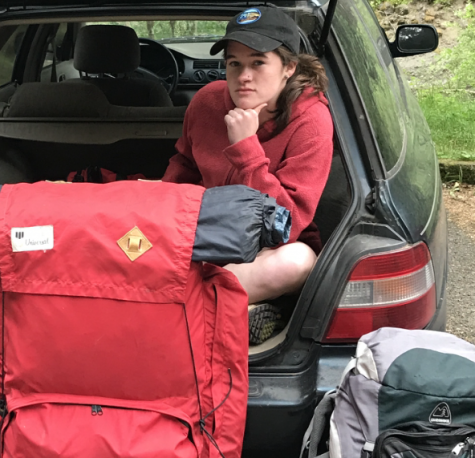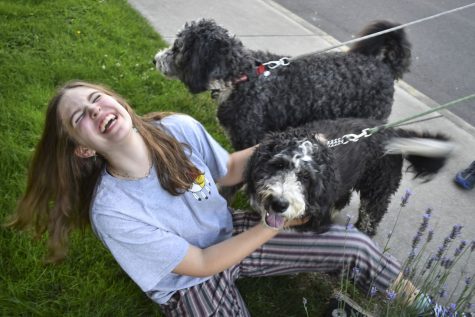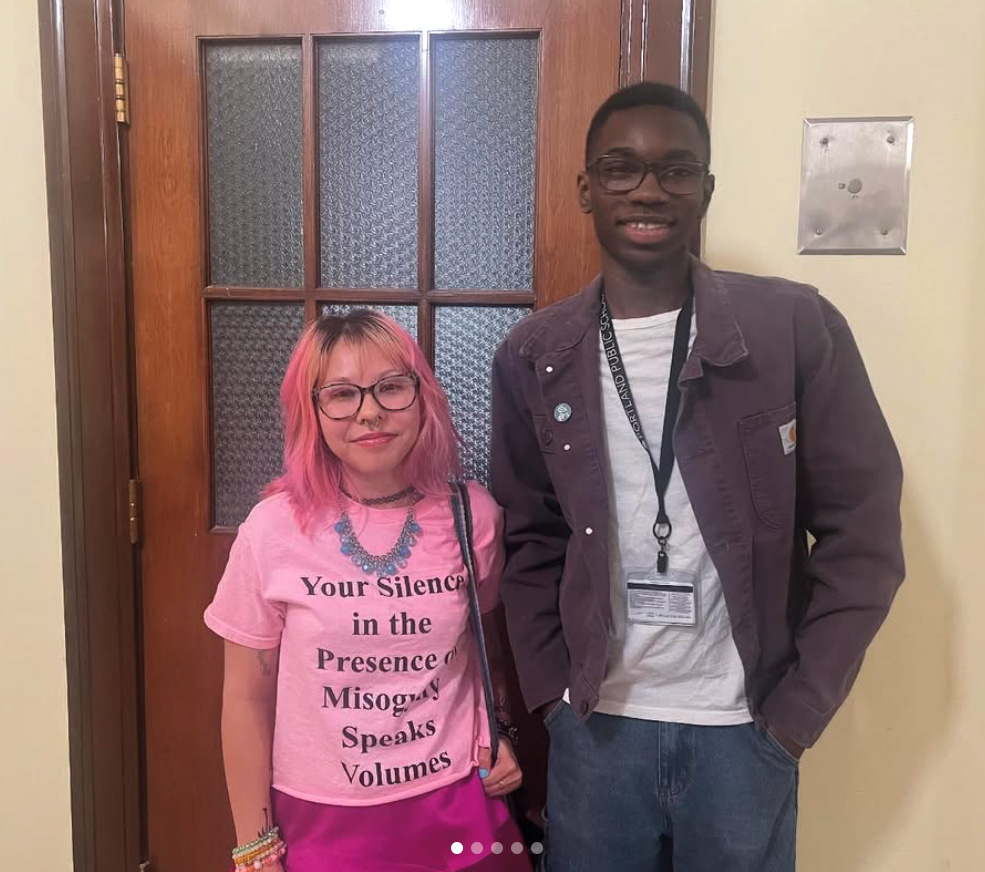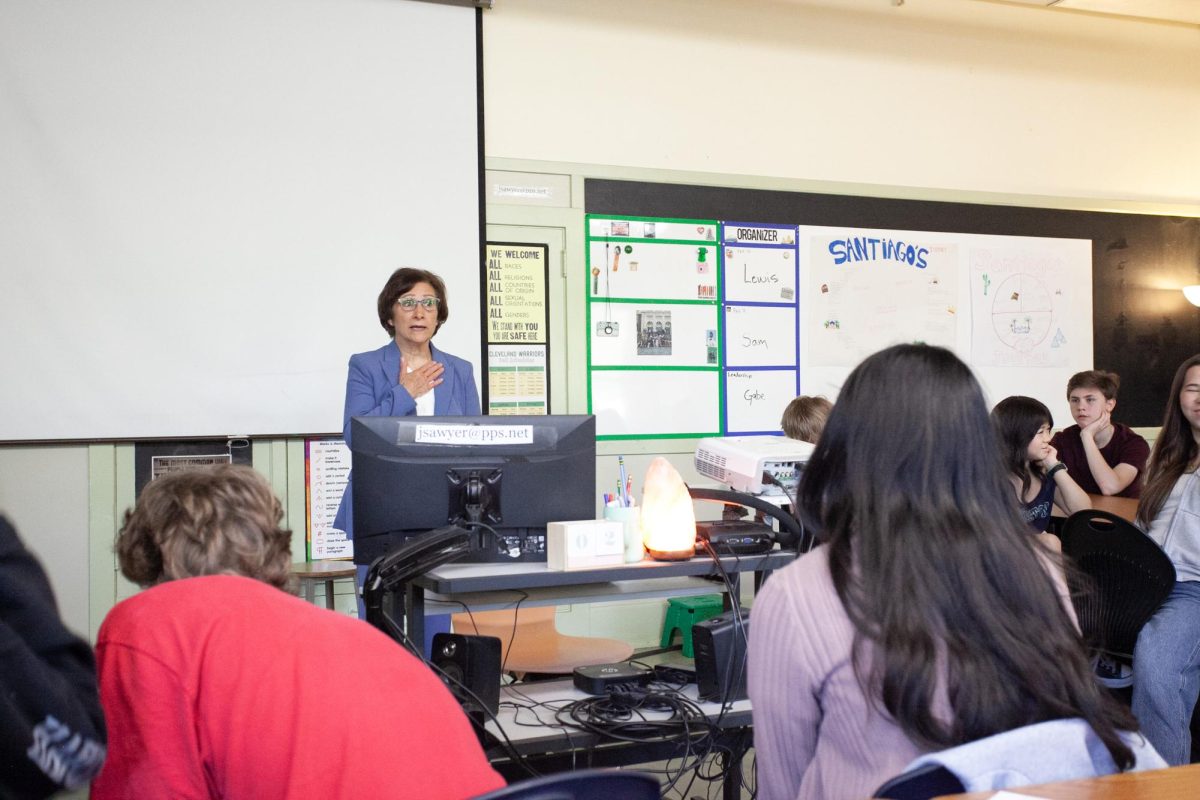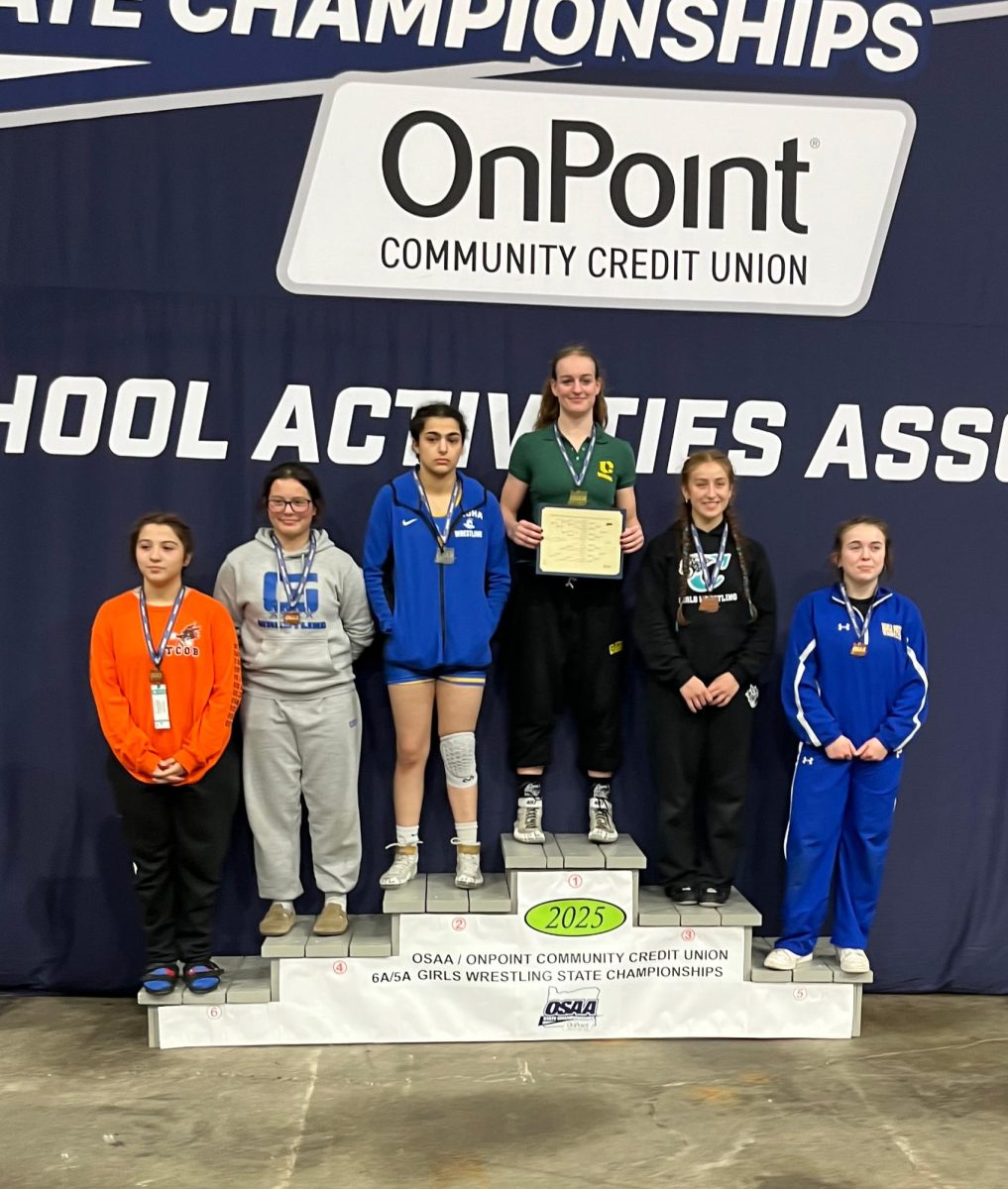Students Walkout to Fight for Climate Justice
December 10, 2019
Fields of protestors packed themselves in Terry Schrunk Plaza across from city hall, sliding through the mud, sneakers ruined, cameras out, scrambling to the front of the crowd to get closer to the speakers. As rallying cheers broke the chilly morning of Sept. 20, the largest climate strike in history began.
Millions of people around the world were unified through a week of protesting and walkouts which pushed world leaders and policy makers to actively work towards climate justice. Swedish environmental activist Greta Thunberg initiated this movement a little over 12 months ago, which has swept the world, and the fight for global climate activism is only growing in strength after this most recent Sept. 20 strike.
Cleveland high school senior Ian Eykamp got involved with this movement through the organization Extinction Rebellion, described as an “environmental pressure group with the stated aim of using civil disobedience to compel government action on climate breakdown, biodiversity loss, and the risk of social and ecological collapse.” Eykamp first learned about the group when his father took him to a meeting over the summer of his junior year. After his initial introduction to Extinction Rebellion, he started to get more involved, and from there helped to spread awareness about the Sept. 20 strike.
The youth who organized the climate strike had four demands to be considered and implemented after the action on Sept. 20.
1) ESTABLISH A CLIMATE TEST TO INSURE CLIMATE IS CONSIDERED IN EVERY POLICY. The mayor is drafting a climate emergency resolution, but it isn’t substantial enough and excludes those who wish to be involved in decision making, like youth and people of color. The demand is that a more substantial resolution be made with the inclusion of the public and frontline communities, and that the city takes into account every policy as it pertains to the environment.
2) STAY HOME TED WHEELER. The mayor was invited to a climate summit in Copenhagen. The demand is that he stay home to develop and finish the climate bill.
3) FUND YOUTH PASS. TriMet currently offers free bus passes only to registered high school students. The demand is that TriMet institute a free youth pass (all ages below 18) to build good habits of using transit in order to lower carbon emissions.
4) STOP ZENITH. Zenith Energy has an oil train terminal in NorthWest Portland which is detrimental to the environment. The demand is that the oil terminals expansion is shut down in order to help lower carbon emissions.
Mayor Ted Wheeler went to the climate summit and claims he is working on meeting the requests of the protestors.
Climate activism and the fight for climate justice will not reach an end after the Sept. 20 strike. Everyone can take action in their daily lives to lower their carbon footprint and help the environment. “I think a lot about the food I eat. I am a vegan because food is, as I see it, the easiest change that any individual can take in reducing their personal climate carbon footprint. But, also, I love to ride my bike. I love living in Portland where everybody is at least partially eco conscious. I try to live the most sustainable life I can personally, and I also spend a lot of time thinking of the consequences and what to do as everybody together in order to make change,” said Eykamp.
After protestors listened to youth climate activists speak in Terry Schrunk Plaza an enormous march across the Hawthorne Bridge led them to OMSI, where a climate fair was held with many art builds and informational trainings to teach youth and Portlanders how to partake in climate justice. Many organizations attended this fair and offered opportunities for students and adults at the strike to sign up and get involved with local climate action.
For those who didn’t get the opportunity to sign up at the rally, some organizations to look into are Extinction Rebellion, 350PDX and Renew Oregon. For additional information, you may also visit the website of Global Climate Strike to continue your own path of environmental activism.
QUOTES:
At the rally, we interviewed students from many PPS schools to ask them four questions.
- Why did you choose to participate in the climate strike?
“I chose to participate because I feel like we, as young people, and fighters for the next generation, we don’t really have a choice other than to join this movement because it really is the most important issue. It’s the most important thing, and it should be the most important thing to everybody right now.” Luna Daniels, senior Lincoln
“I chose to participate because I care about my future and the future of others, and I knew it was gonna be a super impactful day, and there’s gonna be so many people, and so I came and it was even crazier than I thought it was gonna be, there were so many people, like probably thousands of people just in the square.” Sofia Crespo, sophomore Lincoln
“I chose to participate because it’s an important issue right now, and it’s important to get the word out so that people don’t just ignore us and do nothing about it, which is what’s going on.” Calder Nakell, sophomore Franklin (left)
“I’m here because it’s been time for a long time for comprehensive immediate action. That’s not happening, that’s not happened, and it’s time for people to make a change, time for people to stand up.” Nikola Sojourner, junior Franklin (right)
“Well, I think this is one of the most pressing issues and I really do believe in it. I’ve been in this organization, the Sunrise Group, and then 350, which is a youth-led organization. We’re doing screen printing right now to try to get our message out. I really believe in it. I think it’s important.” Bryna Roth, junior Cleveland
- What does climate justice mean to you?
“Climate justice, well, there’s two aspects that I see to it,” said Eykamp. “Reducing carbon emissions overall for everybody on the planet, just so that everybody has a livable future, that future generations will have the same kind of earth that we have today where there is a good environment. And that means there’s going to have to be a radical change to fossil fuel infrastructure and transportation and everything. So that is one of the aspects of climate justice. The other is centering the voices of the communities that are most impacted by climate change and that is, globally, developing nations.” Ian Eykamp
“Climate justice means getting back or getting the climate that we deserve, you know. Clean air, drinkable water, no more pollution, justice for everybody, and justice for people in particular, the indigenous peoples, minorities, people who are on the frontlines and who feel these effects the most.” – Luna Daniels, senior, Lincoln, ART TEAM – helped to screen print shirts, helped paint banner at front of march, contributed idea to make boards for strikers to write their opinions on chalkboards Luna Daniels
“For me it means fighting for a clean healthy planet that we can share with every other living breathing thing here.” Sofia
“Climate justice means to me that, it means justice for the planet, because usually you use justice for people, but the planet’s living too.” Calder
“Just an acknowledgement, and an active acknowledgement, that this planet is the only planet that we are currently able to inhabit, there’s no Planet B. That’s a popular slogan, and that we got to take care of what we got, and that’s not happening. So climate justice in that sense is just keepin’ it alive.” Nikola
“I want policies, I want things put in place, I want caps on carbon emissions, I want caps on how much plastic is produced. The Coca Cola company produces so much plastic it weighs as much as two Taj Mahals, so I think that’s disgusting, and I mean our Earth is dying, if it warms two more degrees celsius, like I want a future and I think this is really important.” Bryna
- What has your experience been at in the march and being involved in the march?
My experience today, it’s been amazing. It’s been surreal, sorta. It’s really crazy seeing everyone that’s come out today, it’s incredible. There’s so many more people than there was at the last strike in March. It’s been incredible, it’s just so many people around us who are on the same page, and we’re all fighting for the same thing, you know. Being a part of organizing the strike has just been incredible and the best thing ever.” Luna
“Just the amazing community here. Like I saw a couple of women on the bridge who were having trouble with the police, and then this other person that she- they came, and they were like rounding up people to stand in solidarity with them, and it was really cool and really inspiring. It’s just, like, the immense community here, it’s such a big community, and it’s such a nice and welcoming one too, like everybody can be a part of it.” Sofia
“It’s been super rad. Everyone’s been really passionate about it. Everyone’s super hyped, screamin’ and stuff about the climate justice and climate action. Yeah, it’s just a huge community of people.” Calder
“I was stoked to hear the speakers. The last one had a super powerful message. It’s just a- I really like the idea that we’re just out here and we’re trying to raise awareness more, trying to get people to act on an issue that is extremely important to a lot of people.” Nikola
“It’s been really great, I know so many people who have been working so hard on this, and we’ve been working on this for months trying to set this up, and to see it, everyone coming together and seeing how many people skipped school and are really into it was really awesome.” Bryna
- How do you implement climate justice into your everyday life?
“Well, the basics, just watching what you eat, eating less meat because the meat industry and the dairy industry are really big contributors to the climate crisis. Taking public transportation, and spreading awareness.” Luna
“I hope to sort of become more involved, with all of the marches and the protests and also just different everyday stuff that you can do to help out different organizations, cuz they’re just so great and they stand for so much goodness and love and peace in the world, and so I really want to become a part of them, probably join the environmental justice club at Lincoln.” Sofia
“I’m already sort of doing that by biking to school every day and biking home from school every day. I’m not old enough to drive a car, but I usually just get everywhere by biking, and I don’t get a lot of places by public transit. Also trying to cut down on meat as well, especially, and big brand products like shopping organically and stuff, that’s mostly what I was doing.” Calder
“I’ve been writing a piece for an AP research class, that’s what I’m working on there for climate movement, and also just lifestyle choices. I don’t eat meat. And of the two vehicles we have they’re both electric.” Nikola
“My family is now doing a plant-based diet, so we do not buy any meat or try to bring any meat into our home cuz that is a lot of the carbon emissions is from beef and meat. And I don’t try to use any excess plastic. I’m trying to bike to school. I mean they’re little things. And then I am in 20 more organizations and I’m gonna try and start a climate change activism group at Cleveland.” Bryna
ORGANIZERS ANSWER WHAT CLIMATE JUSTICE MEANS TO THEM
What does climate justice mean to you?
“It means a future to me. Climate justice means to me that all of the frontline communities that are being disproportionately impacted by this issue are going to get, well, justice. They’re gonna receive the help and the solutions they need in order to combat this crisis, and then in an equitable way as well. If they need funding or something, that’s climate justice, as well as- it’s also part of, you know, the people who are being most impacted by this are the youth and the frontline communities, like indigenous people who protect most of the world’s biodiversity, but they’re also two percent of the world’s population or something. So, it’s stuff like that. Climate justice is helping out those people and giving them what they need in order to fight this and make sure we have a sustainable climate and protect our environment.” -YENA PERICE
“Climate justice, well, there’s two aspects that I see to it. Reducing carbon emissions overall for everybody on the planet, just so that everybody has a livable future, that future generations will have the same kind of earth that we have today where there is a good environment. And that means there’s going to have to be a radical change to fossil fuel infrastructure and transportation and everything. So that is one of the aspects of climate justice, the other is centering the voices of the communities that are most impacted by climate change and that is, globally, developing nations.” -IAN EYKAMP
“Climate justice is the encompassing issue of literally every issue that we have, right, because there’s not only environmental racism or inequities in how we solve law concerning climate justice, but it’s concerning because it encompasses every issue on the Earth just because humanity does live on the Earth, and it’s not as if the Earth is dying, we are making the Earth inhabitable by our conditions, so climate justice in itself means fighting for a future, and fighting for a future to be possible, fighting for a future of intersectional equity and fighting for the future of my peers to even become a possibility.” -LANA PERICE



